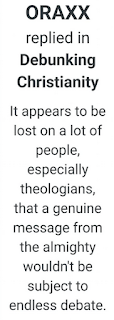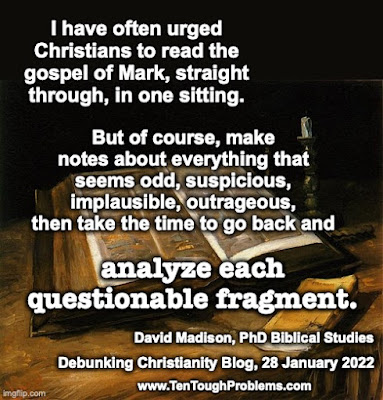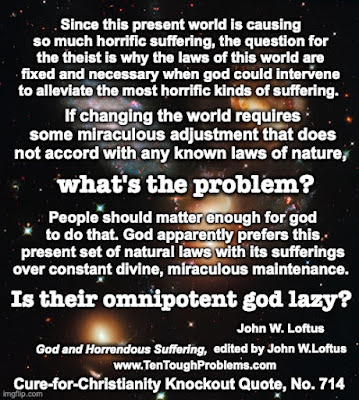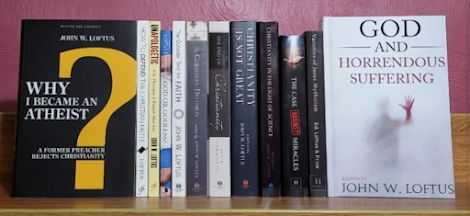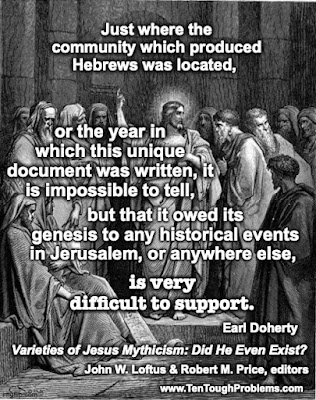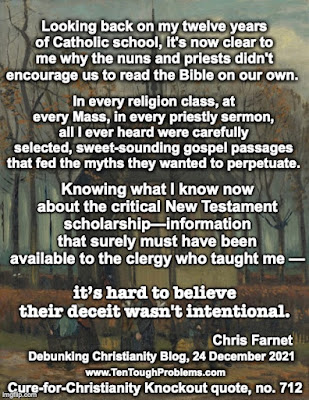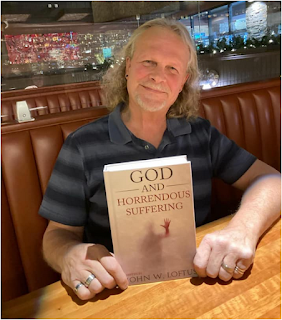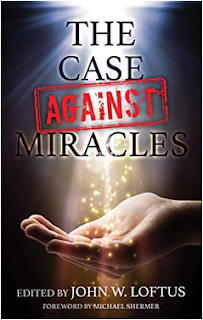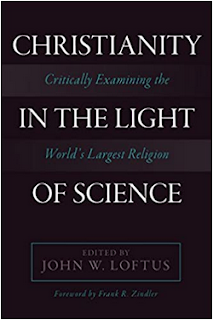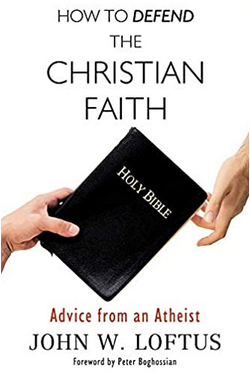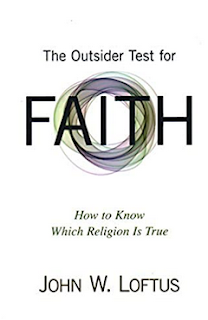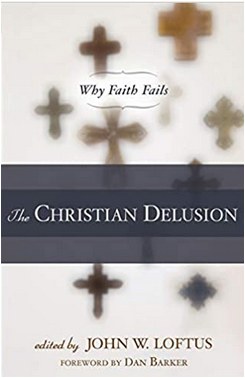We're
celebrating the 12 days of Solstice rather than the 12 days of
Christmas. I'm done writing and editing books. So I'm highlighting each
of my twelve books leading up to the 25th of the month when we party. I'll tell
you something about each of them you probably don't know. [See Tag Below]
The first thing you should know about my book How to Defend the Christian Faith: Advice from an Atheist, is that I first thought of doing such a thing before any of my 12 books were published. This is what I said back in 2006, the year I began blogging. After almost ten years I revisited the concept with a series of fifteen posts titled, "Do You Want to Be A Christian Apologist? Part 1...15". From them I was able to write Part 2 of this book. [Sorry, I drafted these posts since I owe it to my publisher to send people his way]. That same year I also wrote a series of critical posts on every chapter in God and Evil: The Case for God in a World Filled with Pain, edited by Chad Meister, and James K. Dew. [Again, I drafted these posts since I owe it to my publisher to send people his way].
We're
celebrating the 12 days of Solstice rather than the 12 days of
Christmas. I'm done writing and editing books. So I'm highlighting each
of my twelve books leading up to the 25th of the month when we party. I'll tell
you something about each of them you probably don't know. [See Tag Below]
The first thing you should know is that the publisher wanted to name this
book, Deliver Us From Evil. Since my goal was to produce books named
after the
Four Horsemen
(plus Victor Stenger, who just missed that party with his 2007 NY Times
Bestseller, God: The Failed Hypothesis), I was adamantly opposed to it. So was Richard Carrier, and I think
Russell Blackford, who all voiced our objections.
On hindsight, after
I failed to edit a book named after Daniel Dennett's book, like Breaking the Christian Spell,
I wish we had used that provocative title instead. It sounds sexy doesn't it? Deliver Us From Evil. I like it now, especially after the rise to
power of Christian Theocratic/Nationalists with the twice impeached one-term former
President Donald Trump, and the January 6th failed coup attempt on American
democracy after failing to steal a presidential election.
The ongoing damage caused by religion
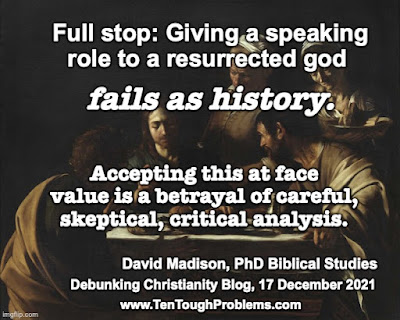
Here’s a rant against Jews that should horrify all Christians:
“… set fire to their synagogues or schools…bury and cover with dirt whatever will not burn, so that no man will ever again see a stone or cinder of them…I advise that their houses also be razed and destroyed. For they pursue in them the same aims as in their synagogues… I advise that all their prayer books and Talmudic writings, in which such idolatry, lies, cursing and blasphemy are taught, be taken from them…I advise that their rabbis be forbidden to teach henceforth on pain of loss of life and limb…I advise that safe-conduct on the highways be abolished completely for the Jews. For they have no business in the countryside, since they are not lords, officials, tradesmen, or the like…I advise that usury be prohibited to them, and that all cash and treasure of silver and gold be taken from them and put aside for safekeeping…I commend putting a flail, an ax, a hoe, a spade, a distaff, or a spindle into the hands of young, strong Jews and Jewesses and letting them earn their bread in the sweat of their brow…”
[This post of mine in this series accidently got deleted, so I'm posting it again] We're celebrating the 12 days of Solstice rather than the 12 days of Christmas, so I'm highlighting each one of them leading up to the 25th of the month. [See Tag Below].
This anthology was named after Sam Harris's book The End of Faith like some others of mine. The so-called New Atheists took aim at God. My books took aim at Christianity in specific, because I knew the most about that religious faith.
After my first anthology, The Christian Delusion, I started telling authors the due date for their submissions was one month earlier than the actual deadline, to avoid last minute submissions. If I was concerned how the chapter was going I would ask for an outline, or rough draft along the way.
Here are some blurbs for my anthology The End of Christianity.
The
Christian Delusion is the first book I give to anyone who wants to understand
why I am no longer a Christian. Loftus and company have returned with The End
of Christianity, which will now be the second book I give to anyone who wants
to read a substantive case against Christian faith.” —Luke Meuhlhauser, owner
of the popular blog Common Sense Atheism, which named Loftus’s book Why I Became an
Atheist as the Best Atheism Book of the Decade (2000-2009).
We're
celebrating the 12 days of Solstice rather than the 12 days of
Christmas. I'm done writing and editing books. So I'm highlighting each
of my twelve books leading up to the 25th of the month when we party. I'll tell
you something about each of them you probably don't know. [See Tag Below]
I envisioned my first anthology The Christian Delusion to be an extension of my first book, Why I Became an Atheist. I thought it would be great to get experts to write on topics I addressed in my book, which I considered essential background reading. All the themes in it expand on issues raised in my book. I personally think The Christian Delusion delivers a powerful blow to conservative Christianity, especially when combined with its predecessor.
Dawkins: I decided to name the book The Christian Delusion after Dawkins' extremely popular bestseller The God Delusion. If his focus was on God, mine was to be focused on the Christian God. I also thought it might get his attention. It didn't. In fact, none of the bestselling atheist writers--the so-called New Atheists--publicly acknowledged my books.
Christians celebrate Christmas in Mexico not just one day, but twelve days! The 12 days start on December 25th and end with a party on January 5th. Perhaps they adopted the number 12 from the the song "The Twelve Days of Christmas"? The message of that song is overtly Christian in every way. Is there a secular counterpart? Please say there is. There should be.
How about celebrating the 12 days of Solstice rather than the 12 days of Christmas? I'm done writing and editing books. So I'll be highlighting each
of my twelve books leading up to the 25th of the month when we party. Your place or mine? I'll tell
you something about each of them you probably don't know. [See Tag Below]
When I first started teaching philosophy classes in 1985 for the College of Lake County, in Grayslake, Illinois, I lost about half my class because the students could not understand me. Yep, that's right. Being in a Ph.D. program at Marquette University, after earning three masters degrees, I didn't know how to bring the information down to college students. I
thought my teaching career was over before it began. Luckily the chair
of the philosophy department told me this happens more often than not for first time
philosophy instructors. Over time I became an expert teacher, bringing highly complex ideas down to first year students.
I eventually learned how to communicate to the average educated person in the pew! My goal is to keep it as simple as possible without being simplistic. The problem with this goal is that there are some elitist readers who think I'm ignorant, for if I was smarter and better educated it would reflect in my vocabulary. Smart, highly educated people, it's assumed, use the nomenclature requisite with their educational achievements.
The
evidential problem of horrendous suffering is one of the most powerful refutations of the
theistic god as can be found: If there’s a theistic omni-everything god, who is
omnibenelovent (or perfectly good), omniscient (or all-knowing), and omnipotent (or all-powerful), the issue
of why there is horrendous suffering in the world requires an explanation. The
reason is that a perfectly good god would want to eliminate it, an all-knowing god
would know how to eliminate it, and an all-powerful god would be able to eliminate
it. So the extent of horrendous suffering means that either god does not care
enough to eliminate it, or god is not smart enough to to eliminate it,
or god is not powerful enough to eliminate it. The stubborn fact of horrendous
suffering means something is wrong with god’s goodness, his knowledge, or his
ability.
Hypatia Press is currently sending out defective books, ones that did not include a section describing the authors. They have been informed of their mistake and are correcting it. So here is that missing section below:
Which we’ve been trained not to notice
“Amazing grace, how sweet the sound, that saved a wretch like me, I once was lost, but now I'm found, was blind, but now I see…” These words were written by Anglican clergyman John Newton in 1772. About the same time these words were also written: “There is balm in Gilead, to make the wounded whole; there's power enough in heaven, to cure a sin-sick soul.” To be saved and cured: one of the most common claims about religion is that it brings comfort. Atheists are sometimes accused of insensitivity: why are we trying to destroy this source of comfort? People count on their religion to get them through the day, but they’ve been prompted in this hope by bad theology: The church has pushed the idea that, in our natural state, we are wretched and sin-sick.
The pre-order for the e-book, "Varieties of Jesus Mythicism" co-edited with Robert M. Price, is up on Amazon! LINK
In a week the paperback will be on Amazon and everywhere else.
This time next week will be the release date, just in time for Black Friday, the start for most xmas shopping etc.
When available I'll send out the print edition link.
The Fallibility of First Principles, by Gunther Laird (gunther.laird@gmail.com)
The late Norman Geisler was one of the most popular
proponents of Evangelical Christianity, wedding Calvinistic argumentation with
technical concepts drawn from the Catholic philosopher Thomas Aquinas.
His son David Geisler continues his work, and recently contacted John W. Loftus
with a syllogism for God’s existence Norman had made in the Baker Encyclopedia of Christian Apologetics.
David asked my editor if he had “any atheistic friends that would be willing to
critique this more comprehensive argument for God’s existence and explain what’s wrong with it,” and I was one such friend, so John contacted me.
What follows is a brief critique of the entry “First
Principles” in the Encyclopedia,
which David copied verbatim in his email to John. The entry is quite
substantive, as Norman Geisler provided very detailed descriptions of a variety
of first principles, such as the Principle of Noncontradiction, the Principle
of Causality, and the Principle of Contingency, and explains why they cannot be
coherently denied under any circumstances.

